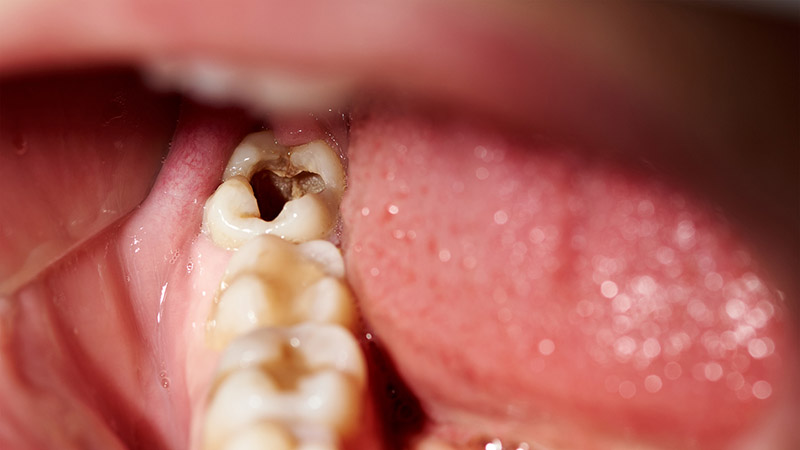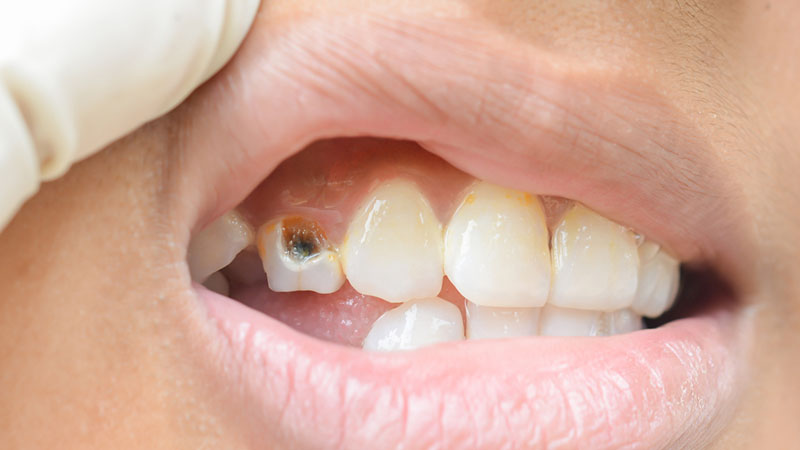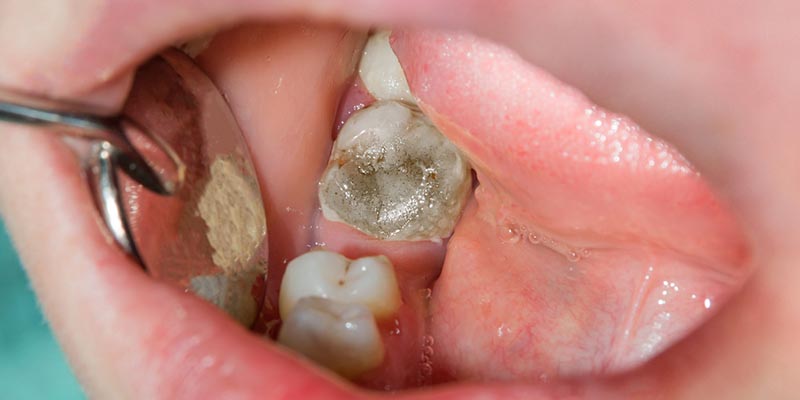Healthy teeth are so vital to your overall health that even a small amount of tooth decay and subsequent pain can cause serious distress, especially when you can’t pinpoint where it’s coming from. You can sometimes see cavities or other dental issues, but a dead tooth is not always easy to visually detect in its early stages. Overall, it’s best to see your dentist right away before it gets any worse.
What is a Dead Tooth?
There are three layers to a tooth consisting of enamel, dentin, and pulp. To stay viable, teeth must have a continuous blood supply to the pulp, the innermost part of the tooth which is comprised of nerves and blood vessels. When the blood supply is cut off to the pulp, the tooth will start to die due to lack of much-needed nutrients and oxygen. This condition is also referred to as a non-vital or necrotic tooth. Left untreated, it will likely become infected, possibly abscessed, and will eventually fall out on its own without proper care.
What Causes a Dead Tooth?
Decay of the Tooth: Through lack of consistent oral hygiene habits, cavities may occur and, over time, will give bacteria access to the soft tissue of the pulp. It will then cause infection and eventually the death of the tooth. Tooth pulp that is healthy will fight off the bacteria as long as it possibly can, but the longer the inflammation goes on, the more likely it is that the tooth will become necrotic.
Tooth Trauma: Physical injury to the tooth can occur suddenly and for many reasons, such as participating in a contact sporting event or possibly a fall where the mouth or face is injured. If not addressed quickly, the blood flow to the tooth may cease, causing the tooth to die.
In general, this is the timeline that takes place that eventually ends with a tooth becoming non-vital:
- Cavity starts to penetrate tooth or dental injury occurs
- Bacteria enter the pulp through a cavity or break in the tooth’s exterior
- Healthy pulp fights bacteria
- Swelling and pressure occur, causing pain
- Tooth nerve is starved of nutrition and oxygen
- Blood flow to the tooth is reduced or stopped altogether resulting in necrotic tooth
Symptoms of a Dead Tooth
If you suspect you have a dead tooth, there are two main symptoms to look for:
Pain: Discomfort in and around the tooth is usually the first indicator that you have a dead tooth. The pain can be minimally irritating to downright excruciating. This is caused by the infection and swelling inside the tooth that puts pressure on the periodontal membrane, the sensitive nerve tissue around the base of the tooth.
Discoloration: A tooth that is dying or dead changes colors due to the lack of blood supply and is similar to a form of bruising. The tooth may turn different colors as it dies, going from yellow to gray, and eventually to black.
As the tooth becomes more infected or abscessed, you might encounter additional symptoms including:
- Swelling of the periodontal membrane around the tooth
- Bad taste in your mouth due to infection
- Bad smell coming from your tooth
- Inflamed sore on the gums indicating an abscess
Treatments for a Dead Tooth
It is imperative to seek quick and efficient treatment for a dying or dead tooth, as there are steps that can be taken to possibly save the tooth or at least keep it from becoming infected. Your dentist will order X-rays to determine the extent of the damage inside the tooth to develop a plan for repair.
Treatment for a dead tooth consists of two options:
Extraction: Early treatment could help deter removal of the tooth, but if it can’t be saved it will have to be pulled to prevent the spread of infection. Tooth extractions are a standard procedure and generally can be done quickly and with little discomfort. Once the tooth is removed, there are a few options to replace the tooth at a later date, such as a dental bridge or dental implant, which can actually improve your oral health.
Root Canal: The procedure essentially involves a deep cleaning of the inside of a tooth to remove infected tissue or abscess, removal of the pulp, and cleaning of the tooth canals. Even if the tooth is dead, it can still be useful as long as it’s not broken. Dead teeth have a tendency to be brittle and easily chip and break, so a dental crown may be needed to add strength and support to the tooth.
How to Prevent a Dead Tooth
Good dental habits and oral hygiene are critical to avoiding a dead tooth. Daily flossing and brushing will keep particles from settling in the gum line and causing decay. Your teeth also need a variety of minerals and vitamins, so eating a healthy diet of fruits and vegetables will help ensure that your teeth get adequate nutrition.
Although physical trauma to your mouth can’t always be avoided, a damaged tooth can often be saved if you act quickly. People active in contact sports, such as football, boxing, or hockey, might consider getting a custom mouth guard (through your dentist) to help reduce or eliminate mouth injuries.
It’s also important to remember that having healthy teeth and gums is essential to your overall health. If you have an infection in one or more of your teeth and the soft tissue becomes necrotic, this can potentially have severe effects on the rest of your body, including your heart. If you suspect you may have a dead tooth, see a dental professional immediately to formulate the best approach to stop the infection and prevent further damage.




